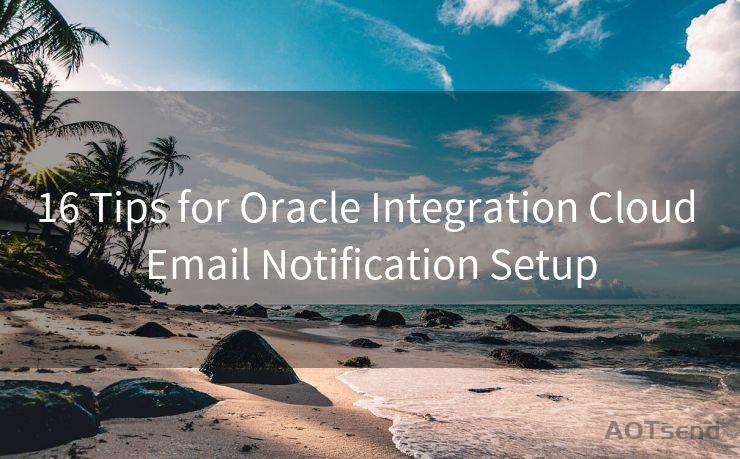16 Tips for Oracle Integration Cloud Email Notification Setup




#1 Understand the Basics
Before diving into the specifics of Oracle Integration Cloud (OIC) email notifications, it's crucial to understand the basics of OIC and its email capabilities. OIC is a cloud-based integration platform that allows businesses to connect and integrate various applications, services, and data sources. One of its powerful features is the ability to send automated email notifications based on specific events or conditions.
#2 Set Up Your Email Server
To enable email notifications in OIC, you first need to configure an email server. This involves specifying the SMTP server details, such as the host, port, username, and password. Ensure that your email server is securely configured and accessible from the OIC environment.
#3 Configure Email Templates
Creating reusable email templates can save a lot of time and effort. In OIC, you can define templates for different types of notifications, such as approvals, alerts, or status updates. Use placeholders for dynamic content that will be replaced with actual data when the email is sent.
#4 Define Recipients and Sender Details
Specify the recipients who should receive the email notifications. You can set up static email addresses or use OIC's data mapping capabilities to dynamically determine the recipients based on business logic. Additionally, configure the sender's email address and name to ensure the emails appear professional and trustworthy.
#5 Test Your Email Setup
Before deploying your email notifications in a production environment, it's essential to test the setup. Send test emails to ensure that they are delivered correctly, the content is accurate, and all placeholders are replaced with the expected data.
#6 Handle Errors and Exceptions
Implement robust error handling mechanisms to manage situations where email notifications fail to send. Set up retry logic, logs, and alerts to notify administrators when there are issues with the email delivery.
#7 Optimize for Mobile Devices
Since many users access their emails on mobile devices, it's important to ensure that your email notifications are mobile-friendly. Use responsive design techniques to ensure the emails display correctly on various screen sizes.
#8 Monitor and Adjust
Regularly monitor the performance of your email notifications. Track metrics such as open rates, click-through rates, and bounce rates. Use this data to fine-tune your email templates, subject lines, and sending frequencies for optimal engagement.
🔔🔔🔔
【AOTsend Email API】:AOTsend is a Managed Email Service for sending transactional emails. Support Email Types: reminders, authentication, confirmations, notifications, verification codes, invoices, password resets, account activations, billing statements, two-factor authentication (2FA), and one-time passwords (OTP) emails, etc. $0.28 per 1000 Emails. 99% Delivery, 98% Inbox Rate.
You might be interested in:
Why did we start the AOTsend project, Brand Story?
What is a Managed Email API, How it Works?
Best 25+ Email Marketing Platforms (Authority,Keywords&Traffic Comparison)
Best 24+ Email Marketing Service (Price, Pros&Cons Comparison)
Email APIs vs SMTP: How they Works, Any Difference?
#9 Secure Your Email Communications
Security is paramount when sending sensitive information via email. Ensure that your email server supports secure protocols like SSL/TLS for encrypted communication. Additionally, consider implementing email signing and encryption to further protect the integrity and confidentiality of your emails.
#10 Comply with Email Regulations
Familiarize yourself with email-related regulations, such as CAN-SPAM or GDPR, and ensure that your email notifications comply with these requirements. This includes obtaining consent, providing an unsubscribe option, and handling personal data securely.
#11 Leverage Advanced Features

Explore advanced features offered by OIC for email notifications, such as attachments, personalized content, or interactive elements. These features can enhance the user experience and improve the effectiveness of your communications.
#12 Integrate with Other Systems
Take advantage of OIC's integration capabilities to connect your email notifications with other business systems. For example, you can trigger emails based on events in your CRM system or update a ticketing system when an email is sent.
#13 Scale Your Email Notifications
As your business grows, ensure that your email notification system can handle the increased volume. Monitor the performance of your email server and adjust its capacity accordingly to avoid delays or failures in email delivery.
#14 Provide Clear and Actionable Content
The content of your email notifications should be clear, concise, and actionable. Use plain language to explain the purpose of the email and provide clear instructions or links for the recipient to take further action.
#15 Regularly Update Your Templates
Keep your email templates up to date with the latest branding, messaging, and legal requirements. Regularly review and update your templates to ensure they remain relevant and engaging for your recipients.
#16 Continuously Improve
Finally, continuously improve your email notification setup based on feedback and analytics. Gather input from recipients, analyze email performance metrics, and iterate on your strategies to enhance the effectiveness of your communications.
By following these 16 tips, you can set up and optimize Oracle Integration Cloud email notifications to improve communication, enhance productivity, and drive better business results. Remember to regularly review and update your setup to ensure it remains aligned with your business goals and recipient preferences.




Scan the QR code to access on your mobile device.
Copyright notice: This article is published by AotSend. Reproduction requires attribution.
Article Link:https://www.mailwot.com/p3540.html



